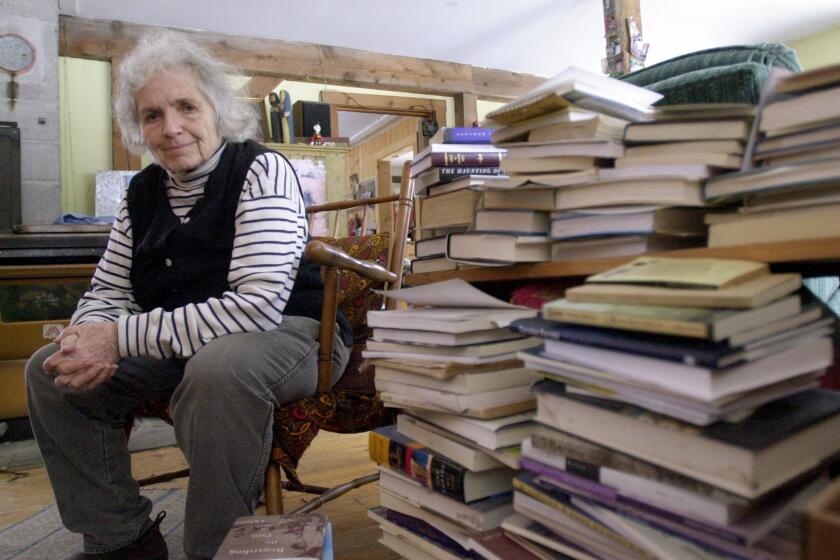Chapters and Verse Trace Path of Illegal Immigrants : Latinos: UC Irvine anthropologist’s book seeks to show the faces, hopes and heartaches behind the statistics.
In “The Dishwasher,” a Mexican folk song of the 1920s, an illegal immigrant tells how he pursued his dreams to California and found a harsh life washing dishes, mixing cement and picking tomatoes.
The tragicomic song, which appears in UC Irvine anthropologist Leo Chavez’s new book about illegal immigrants in San Diego County, ends like this:
Goodby dream of my life, goodby movie stars, I am going back to my beloved homeland, much poorer than when I came.
The historic and cultural roots of Mexican immigration to the United States evoked by this and other folk songs, or corridos, are among the central themes of “Shadowed Lives: Undocumented Immigrants in American Society,” the first book by Chavez, a professor at UCI.
Chavez says he used songs about immigration and extensive interviews in order to let immigrants--the topic of voluminous discussion by experts, advocates and critics--tell their own stories in their own voices.
“The goal of the book is to personalize the immigrant experience beyond the cost-benefit analysis, beyond the politics,” said Chavez, 40, a nationally known expert on immigration. “It is to introduce immigrants as human beings.”
The book emphasizes case histories and personal anecdotes over academic jargon or sweeping conclusions, providing a relatively rare portrait of illegal immigrants, according to other academics. As the research process took Chavez deeper into the shadows of society where his subjects lived, it turned him into a vocal advocate for illegal immigrants and for more tolerant government policies.
Chavez said he wants “Shadowed Lives” to counter a growing current of anti-immigrant sentiment. He contends that illegal immigration has benefited American society by providing a low-wage foundation for prosperity.
“It’s an appeal not to put the blame on immigrants for all the social and economic ills we are having,” he said. “What I didn’t realize is the extent to which the middle-class lifestyle I took for granted was supported by immigrants who are looked down on by our society.
“Some of the most vociferous opposition is (in San Diego), the most vocal anti-immigrant people in the country. People don’t understand that San Diego is what it is because of immigrants who work to maintain the lifestyle that San Diegans enjoy.”
This point of view invites controversy, particularly during an economic crisis when a growing number of political leaders at national, state and local levels are asking hard questions about the costs of and limits on immigration.
Anti-immigration activists blame immigrants for problems ranging from overburdened government services to drug traffic and other crimes.
“It’s not a case of people not having sympathy,” said Encinitas Councilwoman Gail Hano, one of the politicians who has decried the impact of illegal immigration. “It’s a case of (illegal immigrants) committing crimes by crossing the border illegally and the second thing, by camping on property they don’t own. . . . They are a drain on the system, and it’s getting worse. There is no other country that lets the illegals get away with the things the U.S. is letting them get away with.”
Although Hano has not read the book, she participated in a case that Chavez analyzes in depth: a bitter dispute of the late 1980s in which the city of Encinitas fought successfully to shut down a Green Valley squatters camp that was home to hundreds of impoverished immigrant laborers.
At one point in the book, Chavez talks to Anatolia Herrera, a dejected farm worker who has just been evicted from the Green Valley camp. Herrera sits on a log drinking a beer.
‘Why do the Americans detest the Latin Americans, the Mexicans?’ Herrera says. ‘Where will we go? We will continue hovering in corners, like coyotes, like dogs, like lizards. . . . They chase us away. We go over there. They chase us away over there, we come back here, and it continues. . . . We must take flight like the migrant birds. The ones that go from one country to another, the swallows.’
Chavez contends that both sides failed to communicate during the dispute, and that Encinitas and neighboring cities are engaged in a futile attempt to seal themselves off from social reality.
After hearing some of Chavez’s statements about Green Valley, Councilwoman Hano said: “The way he’s describing it is as if the people in this city are bigoted and racist. Give me a break. That’s absolute nonsense.”
Chavez was born in New Mexico, where his family roots go back centuries. He studied at UC Santa Cruz and at Stanford. He earned his doctorate with a study of the Otavalo Indians of Ecuador. When he became a field researcher in 1980 at the newly formed Center for U.S.-Mexico Studies at UC San Diego, he was fascinated by the topic of Latino immigration to the United States, but he was no expert.
Rather than studying Los Angeles, a polyglot mecca that has developed into a veritable laboratory of immigration-related scholarship, Chavez concentrated on San Diego County. He was drawn to the surreal anarchy of the international border, the working-class streets of old urban barrios, the squatter camps and street-corner hiring halls that brought border-style cultural confrontation to Encinitas and other north county suburbs during the past decade.
“I chose San Diego because it has a flavor all its own, a character all its own,” Chavez said. “The contrasts are striking, they are sharpened and clear. That puts things into relief. The positions on immigration are staked out, and that helps you understand what’s going on.”
Chavez conducted years of fieldwork on both sides of the border, gaining a Mexican perspective as a researcher at the College of the Northern Border in Tijuana. He gradually won the trust of his subjects: Central Americans and Mexicans, children and grandparents, recent arrivals living in ramshackle huts and longtime illegal residents whose Americanized life--comfortable house, cars, a yard--hid their lingering fear of discovery.
The stories he tells show the absurdities and pains of the illegal immigrants’ experience. One night at the border, hundreds of northward-bound people stop to take part in an open-air Good Friday Mass, within yards of the fence and the Border Patrol.
An undocumented woman in San Diego has her baby at home and fails to get him a birth certificate because she fears contact with the authorities, making him a child without a country.
A teen-ager named Guadalupe, now legal and planning to attend San Diego State University, recalls the trauma of Immigration and Naturalization Service agents showing up at school and arresting her when she was 10:
“They just came in and took us and there wasn’t any time to ask anything. . . . Everybody is making fun of you, or they just watch and it’s embarrassing for you even if they don’t make fun of you, because you’re different from everybody else.”
Accompanying the stories are photos and the folk songs that weave a musical history of Mexican attitudes toward immigration and the United States.
“These guys listen to music all the time,” Chavez said. “Songs are one way that people tell each other about their lives.”
The final chapter examines some policy questions that Chavez says are key to the position and perception of illegal immigrants as rootless outsiders. For example, Chavez has been active in opposing state policies requiring longtime illegal residents of the state to pay foreign-student tuition.
“Society puts major obstacles in their way,” he said, describing the case of an undocumented student with a 3.95 grade-point average. She came to the United States at 11 and has been admitted to UC Berkeley, but she now faces paying foreign-student tuition.
“They are being treated as if they just came from Tehran or Paris,” Chavez said. “Here is a person whose parents have paid taxes for years.”
Chavez also believes the federal government should do more to offset the impact of immigrants on local services and allow more legal immigration from Mexico and Central America. He does not support the idea of an open border, but he says anti-immigrant activism ignores the extent to which the Latino immigration presence is embedded in our society, dating back to the time when Southern California was part of Mexico.
“All we are doing is going forward into the past,” he said.
The last song in “Shadowed Lives” is entitled “The Gilded Cage.” The singer, who has made a successful new life for himself, laments that his children no longer speak Spanish or feel any bond to their birthplace:
They no longer remember my beloved Mexico, which I never forget, and to which I can never return. . . .
More to Read
Sign up for our Book Club newsletter
Get the latest news, events and more from the Los Angeles Times Book Club, and help us get L.A. reading and talking.
You may occasionally receive promotional content from the Los Angeles Times.






